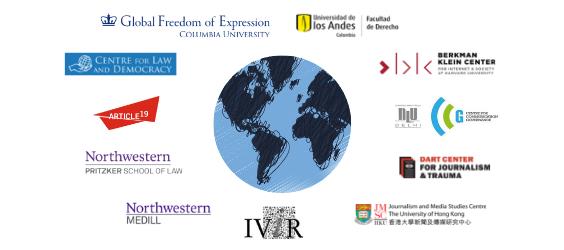New York, N.Y. (Mar. 28, 2018) — Columbia Global Freedom of Expression has launched a new teaching portal Freedom of Expression Without Frontiers, in partnership with 10 Universities and civil society organizations from around the world, to promote the adoption of a global approach to the teaching of free speech.
Freedom of Expression Without Frontiers grew out of meetings held at Columbia University, which concluded that the teaching of free speech, media law or communication remains heavily centered on one country and one discipline, and as such is badly out of alignment with the global reality, including the global information ecosystem of the 21st century.
“Universities in general, and Columbia University in particular, are or should be major contributors in the effort to address the global challenges we must meet now and in the future to preserve and better our world. To do so, we must understand the world not as discrete units but rather as a vast, inter-connected whole, a network,” said Lee C. Bollinger, president of Columbia University, a noted First Amendment scholar and founder of Columbia Global Freedom of Expression. “Freedom of Expression Without Frontiers seeks to instill an understanding of our media, information and communication world that transcend a particular jurisdiction, political or cultural standpoint and embraces a global perspective.”
Freedom of Expression Without Frontiers offers close to 300 academic and training resources on the laws, institutions and actors that have founded a global system of freedom of expression, information and media. Its target audiences include educators who wish to design and offer courses and trainings on this global information ecosystem, and students, journalists, legal practitioners who wish to engage and understand free speech issues from a global standpoint.
Dr. Agnes Callamard, director of Columbia Global Freedom of Expression, said that “A global perspective on freedom of expression is predicated on the notion that over the last 70 years, since the adoption of the Universal Declaration of Human Rights, a global village of free speech precedents, standards, laws and practices has been established.” She adds “This does not mean that Freedom of Expression Without Frontiers ignores the challenges that this global construction has brought about. On the contrary, it acknowledges and studies the conflicts between global information flows and national jurisdiction and state sovereignty, and what it means for the realization of a borderless vision for the right to freedom of expression.”
The Portal includes pedagogical resources designed by professors and trainers from different parts of the world and across different disciplines. The website is organized under nine teaching modules, each of which covers a variety of themes within subject areas. For example, the module on Journalism offers resources exploring how international and regional law and bodies have defined the practice of journalism — from the rejection of licensing, to the protection of journalistic sources, and the importance of self-regulation — and debating the professional and ethical standards that ought to be demanded of citizen journalists and bloggers. Resources can be segmented further according to their fields and medium, such as required readings, international standards, jurisprudence, academic articles, Massive Online Open Courses (MOOC) and other multimedia resources.
“At a time when our common values and standards are under attack, at a time when we are confronting around the world closed-minded ideologies of bigotry and intolerance, Freedom of Expression Without Frontiers shows the richness, relevance and importance of a global perspective and global understanding to freedom of expression,” Dr. Callamard emphasized.
“Freedom of Expression Without Frontier is ultimately about the power of global knowledge, flowing across frontiers, and it is about the power of global citizenship.” said President Bollinger.
For more information about the Teaching Portal and opportunities for collaboration, contact us at globalfreespeech@columbia.edu. The founding partners (logos are available in high-resolution) include:
- School of Law, University of Los Andes (Bogotá, Colombia)
- Berkman Klein Center for Internet & Society, Harvard University (Cambridge, US)
- Centre for Communication Governance, National Law University (Delhi, India)
- Dart Center for Journalism and Trauma, Columbia University Graduate School of Journalism (New York, US)
- Journalism and Media Studies Centre, The University of Hong Kong (Hong Kong)
- Institute for Information Law (IViR), Amsterdam Law School, University of Amsterdam (Amsterdam, the Netherlands)
- Pritzker School of Law, Northwestern University (Chicago, US)
- Medill School of Journalism, Media, Integrated Marketing Communications, Northwestern University (Evanston, US)
- Article 19 (London, UK)
- Centre for Law and Democracy (Halifax, Canada)
